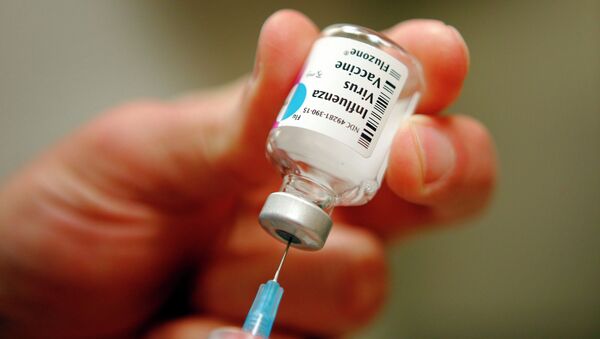According to the study, the phenomenon of cross-protection - when the body’s immune response to one disease helps it fight off another as well - might extend to influenza and SARS-CoV-2, the virus that causes COVID-19.
The research was conducted by a team of scientists at Radboud University Medical Center in the Netherlands, who published their work on MedRxiv, a pre-print server for papers. A disclaimer atop the report notes: “This article is a preprint and has not been peer-reviewed. It reports new medical research that has yet to be evaluated and so should not be used to guide clinical practice.”
The report’s abstract notes that while several epidemiological studies have suggested that there is “cross-protection between influenza vaccination and COVID-19 during the current pandemic … the mechanism behind such an effect is unknown.”
“Using an established in-vitro model of trained immunity, we demonstrate that the quadrivalent inactivated influenza vaccine used in the Netherlands in the 2019-2020 influenza season can induce a trained immunity response, including an improvement of cytokine responses after stimulation of human immune cells with SARS-CoV-2,” the researchers write.
“In addition, we found that SARS-CoV-2 infection was less common among Dutch hospital employees who had received influenza vaccination during the 2019/2020 winter season.”
The study reports that among some 10,600 Radboud hospital employees, 2.23% of those who did not get the flu shot during the previous winter contracted COVID-19, while only 1.33% of those who received a flu shot got the novel coronavirus.
Mihai Netea, an infectious disease immunologist at Radboud who co-authored the study, told Scientific American that while the results might be conflating correlation with causation, a true clinical trial would require randomly denying a control group their flu shots. “That’s not ethical,” he said.
However, other studies looking at how to enhance the body’s response to COVID-19 have suggested it may not be as easy as initially believed. A study published earlier this month in the British Medical Journal found that administering convalescent plasma therapy to hospitalized patients with COVID-19 had almost no effect on overall outcomes, including mortality.
According to an editorial accompanying the study, while giving patients the blood of people who survived COVID-19, which is laced with the antibodies their bodies used to fight off the virus, seemed to have some effect on alleviating some symptoms of the virus, the method of plasma therapy itself likely amplifies the thrombotic effects of COVID-19, making the patient’s blood even thicker and more prone to clotting.
Still, with the flu season rapidly approaching and COVID-19 cases rising rapidly in Europe and the United States, getting your flu shot could scarcely hurt. The US Centers for Disease Control and Prevention have advised that the temporary flu vaccine limits contraction of the disease by 40% to 60%. Further, the flu caused nearly 500,000 hospitalizations and 34,200 deaths in the US in 2019, though its overall mortality rate remains perhaps one-tenth that of COVID-19.

